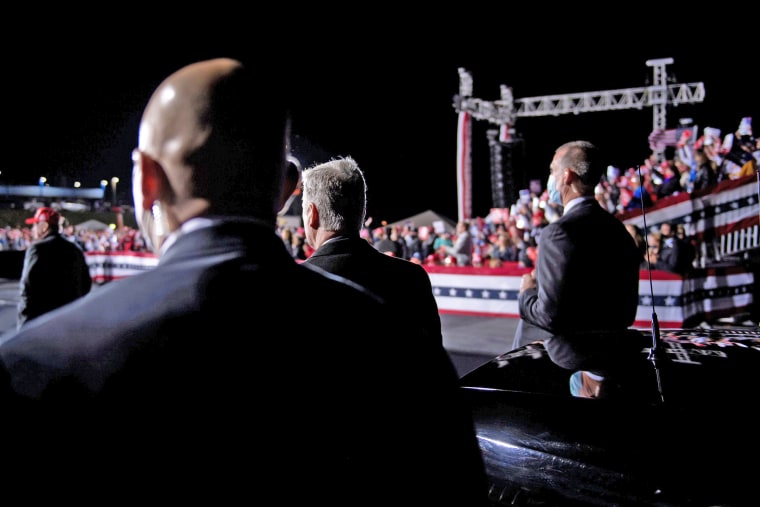In the runup to Election Day 2020, Donald Trump didn't just fail in his response to the coronavirus pandemic, he was also accused of taking deliberate steps to make the crisis worse through super-spreader campaign rallies.
The week before the election, for example, several COVID-19 outbreaks in Minnesota were linked to the Republican president's political events. The news came on the heels of a USA Today report that noted, "As President Donald Trump jetted across the country holding campaign rallies during the past two months, he didn't just defy state orders and federal health guidelines. He left a trail of coronavirus outbreaks in his wake."
But it wasn't just Republican voters who were affected, because they weren't the only ones in attendance. The Washington Post reported this morning:
More than 130 Secret Service officers who help protect the White House and the president when he travels have recently been ordered to isolate or quarantine because they tested positive for the coronavirus or had close contact with infected co-workers, according to three people familiar with agency staffing.
The newspaper added that the coronavirus has sidelined roughly 10% of the Secret Service's core security team, and the spread within the agency "is believed to be partly linked to a series of campaign rallies that President Trump held in the weeks before the Nov. 3 election."
It's hard not to get the impression that the outgoing Republican president isn't exactly popular with those responsible for protecting him and his family.
For example, in early October, as the public learned of Trump's coronavirus infection, it wasn't long before attention shifted to the agents who are required to remain in close proximity to the president. The Washington Post reported that agents "expressed their anger and frustration to colleagues and friends," explaining that Trump's actions had repeatedly put them at risk. "He's never cared about us," one agent told a confidant.
The report added that former Secret Service agents said it was unheard of for agents to openly complain about a sitting president, "but that some currently in the ranks had become convinced during the pandemic that Trump was willing to put his protectors in harm's way."
During his hospitalization, Trump also thought it'd be a good idea to go for a little joy ride, waving at his fans despite his ailment, seemingly putting agents in his hermetically-sealed vehicle at greater risk. As the Post added soon after, the Secret Service was, once again, not impressed. One agent said after the trip, in refence to Trump, "He's not even pretending to care now."
It's a quote with new resonance in light of the latest reporting.
As we discussed at the time, the relationship between Trump and the Secret Service has long been strained. In late May, for example, during a period of unrest outside the White House, the president published tweets about the security situation, only to have the Secret Service soon after issue a written statement contradicting Trump's claims.
It wasn't the first time. As regular readers may recall, in 2017, a leading member of Trump's legal team tried to blame the Secret Service for the infamous 2016 meeting in Trump Tower with a Kremlin-linked attorney, prompting the Secret Service to make a rare entry into a political debate in order to defend the agents' actions.
More recently, in April 2020, White House officials tried to force a CNN reporter to the back of the press briefing room, and when CNN White House correspondent Kaitlan Collins resisted, she was told the matter would be resolved by the Secret Service.
Soon after, the Secret Service told the White House Correspondents' Association that the agency was "not involved whatsoever in this effort."
But those incidents appeared to merely annoy the Secret Service. Trump putting agents' health at risk is vastly and qualitatively worse.

